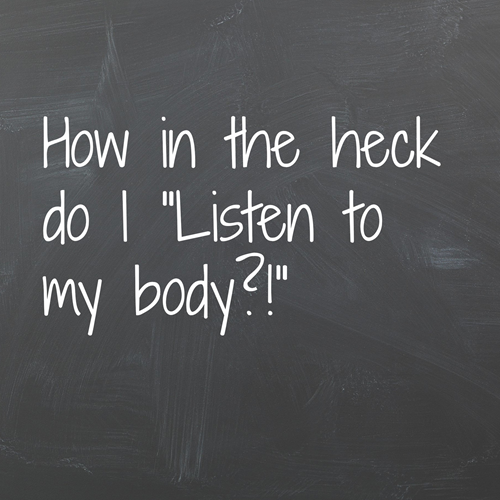Some thoughts and discussions from me.
Is it just Colorado, or is October being really nice to everyone this year?!
The past 2 weeks have been tank top and shorts days!! Naturally, I put away my summer clothes for the season precisely 2 weeks ago. Funny how that happens, right? I guess it’s better than the other way around. I’d rather take 80 degree temps in jeans than 20 degree temps in shorts! Ha!
So, on to today’s topic of discussion : Listening to our Bodies.
Be honest: how many of you who have ever been told to “Listen to your body,” have actually imagined yourself physically listening to a body part tell you what’s up? Like, ear to knee, listening to a story. Gosh, I hope I’m not the only one who turned something very important into a cartoon image in my mind!
Listening to your body can be interpreted as kind of a “woo woo” practice to some – and I used to think the very same thing. But now I realize that your body does indeed send you signals, communicating its needs. And if you pay close enough attention, those signals are communicated loudly and clearly.
Need a rest day? Listen to your body. Hit a PR? Listen to your body. Eat more? Eat less? Exercise at what time of the day? Listen to your body.
Nearly every preventable physical ailment starts with a whisper from your body. If you ignore it, the whisper becomes an inside voice, then an outside voice, and then it might as well be shouting at you as you wind up over trained, injured, or sick.
But it’s not that easy to hear a whisper if you’re not listening for it. Listening to your body is a learned skill. It takes time, patience, and acceptance.
Now, sometimes it’s easy to hear what your body is trying to tell you because it uses the very blunt language of pain. If your knee hurts while walking, your body is clearly trying to tell you NOT TO RUN through that pain. Just like if your shoulder had a nagging pain all day, your body’s probably trying to tell you not go heavy on your overhead press (or at all.)
However, sometimes our body sends us signals that are a little harder to hear – those whispers. So, How in the heck do I listen to my body when it’s being a little more subtle in its message delivery? Take a few minutes several times throughout the day and check in with yourself. Are you calm, peaceful, mindful, and content? Great! Keep on going with your day. If you’re not feeling so peachy keen, make sure to keep a heads up for some of the following cues.
How Does Your Body Communicate to You, and Why?
1. Overtraining.
The #1 way to listen to your body to make sure you’re not doing too much is to watch out for signs of overtraining. Last week I wrote about the overuse of HIIT workouts, and how every workout doesn’t need to be an all out battle, because that could leave to overtraining, or worse, injury. Perhaps you think your fitness regimen is perfectly healthy and balanced because you take one day off, or because you’re not injured (yet.) However, you always need to be careful that you’re not experiencing signs of overtraining:
- higher resting heart rate
- fatigue throughout the day
- increase or suppression of appetite
- low energy or brain fog during regular activity
- insomnia
- a lingering cold that won’t go away
- nagging pains that aren’t getting better
- menstrual irregularity
If you think you might be experiencing signs of over training, my suggestion is to back off your workouts, take a rest week or two, and/or decrease the intensity of your workouts.
2. Stress.
It’s important that you learn the way your body physically manifests stressors in your life. For me, I know I’m stressed when my chest is tight, my appetites down, I have endless songs stuck in my head, and I can’t concentrate. Oh, and sleep is hard to come by when I’m stressed, too. It’s hard to list cues of stress to look for because it’s so individual, but common signals are:
- irritability
- knots in stomach
- trouble sleeping
- fatigue
- difficulty concentrating
I know that exercise is a stressor, just as is work, relationship conflict, personal conflict, deadlines, presentations, etc. When I’m feeling signs of stressed, I take a look at what I can dial back. Usually this means I take a break from my phone, or perhaps dial back my workout intensity for a few a days.
3. Hunger/macros.
To me, being in tune with what my body needs as far as nutrition goes takes the most amount of time and patience. In other words, I have to listen very carefully to hear the whispers my body’s telling me is best for it. And really, the only way you can determine what’s best for you is to experiment, and pay attention. I’m not saying to try anything dangerous, but several tests I have my clients conduct on themselves are:
- to see if they thrive best on low, moderate, or high carbohydrate diets
- to see if they thrive best on 5 small meals, or 2-3 larger meals
- to see if they thrive best front-loading or back-loading their calories and carbohydrates
- to see if they thrive best eating right before a workout, or several hours before a workout
- to see if they thrive best reaching their goals on a certain amount of calories or food
plus a few others!
Listen for cues like brain fog, hunger, cravings, sleepiness during the day, trouble sleeping at night, dependence on caffeine, a “need” for certain food, anxiety surrounding food, shakiness/headaches, and unexpected weight loss/gain to signal that a change in nutrition might be needed.
4. Sleep.
Sleep is a channel through which my body communicates to me constantly – well, every night! If I’m having trouble falling – or staying – asleep at night, I know I need to change something.
For me, that’s usually nutrition. Through trial and error (there’s that patience and time thing again!) I’ve learned that my circadian rhythm is at its happiest when I eat breakfast within 30-60 minutes of waking, get plenty of vitamin D, and either eat a carb-heavy dinner, or nighttime snack.
Being able to listen to the cues your body gives you takes time, patience, and an open mind ear. It’s when we shut out these signals and keep on doing what we want to do that we get into trouble – overtraining, injury, cycle disruptions, etc. Even if everyone and their mother is hopping on the latest nutrition or fitness trend, it doesn’t necessarily mean you should, too. Listen to your body.
I want to know what YOU think:
How do you most often listen to your body?
Have you ever ignored signals from your body and wound up in trouble?
[efb_likebox fanpage_url=”yourtrainerpaige” box_width=”250″ box_height=”” colorscheme=”light” locale=”en_US” responsive=”0″ show_faces=”1″ show_header=”1″ show_stream=”0″ show_border=”1″ ]
Find me on Facebook, Instagram, Twitter, and Pinterest for workout and exercise videos, training tips, and inspiration! And don’t forget to sign up for my newsletter for weekly emails with workouts, tips, information, and inspiration!
If you’re interested in 1-on-1 personal coaching or training programs, you can learn more here.






Love, love, love all of these!! I had to take a rest week last week because of stress. My body didn’t need additional stress in the form of workouts. I love your approach girl!
Brittany @ Delights and Delectables recently posted…Baby Delight: 9 Months
xoxo Hope this week is less stressful for you, hon!
This post is so great! I am constantly reminding myself to listen to my body and to don’t choose what I “should” do. I feel like I have grown so much and especially with food I am listening to all cues. With exercise it is a different story, I consider myself a strong woman and that I can push through the pain. In the end, my body wins so thanks for sharing this, it was what I needed. 🙂
Elsie @ Sharing Healthiness recently posted…5 STAR Friday (24/10/14) – Longer than a Marathon, DIY Fake Teeth, Fall Jewelry & More!
That is so great, Elsie! 🙂 My thing used to be my workout schedule. If was on my schedule, it was getting done, regardless of what my body was telling me. Glad I’m over that notion!
I didn’t listen to my body earlier this year — I decided it was just being wimpy and needed a little kick in the pants. Yea, I was wrong and I ended up with an overuse injury [but still seriously hate the word injury!]. And what am I doing now? Listening to my body…but for many, many, many weeks rather than just the 2-3 I could have given it earlier this year. So…listen to your body before it has to yell at you!
Oh, and sometimes listening to your body really sucks…but it’ll thank you later! 🙂
Heidi Nicole recently posted…Six Weeks Waiting…
Amen, sister! Sometimes it just sucks that we don’t like what it is we hear, right? 😉
Wow this is super helpful, thanks for sharing. I definitely hear the phrase “listen to your body” and sometimes it’s really difficult to get your motivation and body in sync!
Georgie recently posted…Chocolate Chunk Pumpkin Muffins {Gluten-Free}
Really, really great tips. It’s so true that our bodies tell us all that we need to hear–we just have to know how to listen. Or to NOT ignore what it tells us. I have definitely been guilty of the latter. And lately I’ve been noticing that I get interrupted sleep if I drink some wine, which makes me sad. I don’t want to give up the occasional glass but I also don’t want to be tired!
misszippy1 recently posted…A chat with ultra legend Tom Green
Exactly!
Ahh, that would give me the sadz, too!
Great post! I have definitely struggled with listening to my body. It finally caught up with me this past year with my hormones going crazy, suffering a few miscarriages and being diagnosed hypothyroidism. Stress, over exercise, and eating too low carb for my activity level are most likely to blame. So now I’m taking extra caution to be sure and listen to my body and watch for those signs you discussed above 🙂
This post came at a perfect time! I’ve been fighting a nasty cold and finally took a rest day today. I often feel guilty for unscheduled rest days in my training schedule. I needed to read this today!
Me too! It snuck up on me on Friday, and I’ve really dialed back my workouts in hopes that it doesn’t turn into a full fledged knock out cold! Feel better 🙂
Haha this post is really making me think! At first I thought, please, I’ve got this down! I’ve gotten so good at avoiding over-training and knowing when I’m stressed. But the other two – not so much. I’ve been trying to follow certain plans, which suggest veggies and protein at dinner but I’m so used to (and usually crave) carbs in the evening. So I’m struggling with whether to follow the plan to loose weight, or give in to carbs at night (which I could also be craving due to stress?). Haha so many factors!
Also, I haven’t been a good sleeper since high school. I can’t remember the last time I went to bed and woke up in the morning without waking up several times during the night. Usually I wake up at least 2-3 times, and then I’m half asleep for about an hour before my alarm goes off – drifting in and out. I guess I thought this was normal since it’s how I’ve always been!
I’m not knocking the plan you’re doing – at ALL – but everyone’s different. Some people do really well eating the majority of their carbs in the morning, and then tapering off as the day goes on, and some vice versa. Personally, I do well eating protein, fats, and veggies until mid-afternoon (and/or post-workout) and then start eating starchier carbs. But, that’s not 100% of the time, and not for every single person. And like you said – SO many factors.
Great post! I think the only good thing about going through a rough patch with running was being forced to step away and realize what kind of exercise my body wants and likes. This also helped me find balance in meals and what I needed before/after working out. I’m more in tune with my body than ever. Again, really love this post. Sometimes we forget to just go with what our guts are telling us.
Lindsay recently posted…flying over the beach.
Haha, I have always felt a little crazy because when I get stressed I get songs stuck on repeat in my head! I’m glad it’s not just me! It’s often just a few lines from the song and it drives me nuts! It wasn’t until the past year that I realized it was a signal that I’m too stressed. Slowing down, meditating, and doing yoga is my go-to fix 🙂
This is awesome, Paige! These are definitely some tips that we all need since “listening to your body” is such an abstract concept sometimes. Lately I’ve been having the most trouble listening to when my body needs rest. Sometimes I think I haven’t “done enough” workout-wise during the week, so I push myself to do more on days when I’m just plain tired. I have to remember that college life is draining, and walking around campus can be great exercise too 🙂
Alison @ Daily Moves and Grooves recently posted…Current Simple Joys
I’m working on listening to my body more!
This post has come at the perfect time for me! I think I’ve reached a state of overtraining and have no idea what to do about it?! I took 1 week off, went back to the gym and it doesn’t seemed to have helped. How are you supposed to know when your body has recovered if you’ve pushed it for a long period of time?
Sometimes if we push and push and push ourselves, it takes longer to fully recover. If you don’t have the means to work with a health coach or specialist, I’d keep your workouts dialed back, and keep checking those overtraining symptoms. How do you know you’ve reached a state of overtraining?
Thanks for the reply Paige!
Well I assume so as I’ve got an increased resting heart rate, especially on waking and after small exertions of energy, I feel very depressed after I workout and unable to focus/concentrate, I’ve been getting headaches, and mild insomnia where I’m waking up at around 3 am whatever time I go to bed. Last leg workout I was pretty much on the sofa all day with exhaustion. I dont know if this is coincidental to being ‘overdone’ either, but I’ve been getting terrible jawline and neck acne flare ups, which I’ve not had previously. Again, I don’t know that it is overtraining, I realise people can throw around the term over training very naively. I just know I’ve ben training to failure for a long time and never really take exteNeded time off, apart from my rest days.
Sorry for the long comment!
i think HR variability is key! we use that tactic for training a lot. speaking of.. i need to check mine more